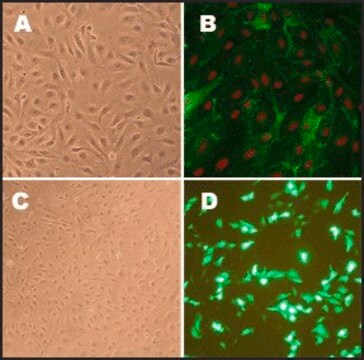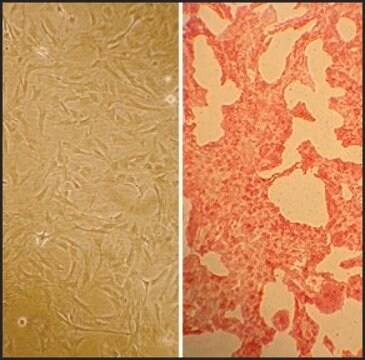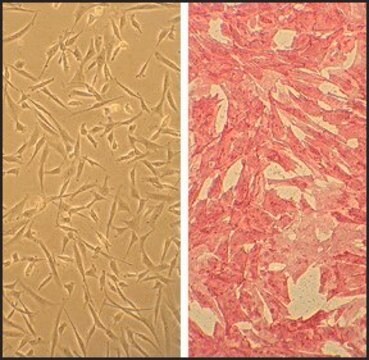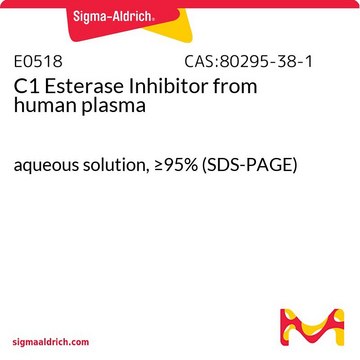352-05A
Human Pulmonary Artery Smooth Muscle Cells: HPASMC, adult
About This Item
Empfohlene Produkte
Biologische Quelle
human intrathoratic artery (normal)
Qualitätsniveau
Verpackung
pkg of 500,000 cells
Hersteller/Markenname
Cell Applications, Inc
Wachstumsmodus
Adherent
Karyotyp
2n = 46
Morphologie
smooth muscle
Methode(n)
cell culture | mammalian: suitable
Relevante Krankheit(en)
cardiovascular diseases
Versandbedingung
dry ice
Lagertemp.
−196°C
Allgemeine Beschreibung
HPASMC has been used to show that IL-22 promotes the growth of pulmonary vascular SMCs via a signaling mechanism that involves NADPH oxidase-dependent oxidation (Bansal, 2013). Inducers of pulmonary hypertension, characterized by thickened pulmonary arterial walls, activate expression of anti-apoptotic Bcl-xL gene via binding of GATA-4 to its promoter; the activation can be suppressed by targeting gata4 gene transcription (Suzuki, 2007). Serotonin induces growth of Pulmonary Artery Smooth Muscle Cells and is able to transactivate the BMP receptor in pulmonary artery SMCs, leading to activation of Smads 1/5/8 via Rho and Rho kinase pathway (Liu, 2009). Pulmonary Artery Smooth Muscle Cells growth can be suppressed by trans-retinoic acid by inducing expression of GADD45A, a known cell growth suppressor, downstream of the retinoid acid receptors RARalpha, RARbeta, RARgamma, RXRalpha, and RXRbeta, indicating possible involvement of retinoic acid in pulmonary vascular remodeling (Preston, 2005). Treatment of Pulmonary Artery Smooth Muscle Cells with plasma containing reduced levels of all-trans RA and 13-cis RA promoted cell growth (Day, 2009). Retinoic acid was also shown to inhibit migration of pulmonary smooth muscle cells by inhibiting PI3K/Akt-dependent reorganization of actin cytoskeleton (Day, 2006). Pulmonary Artery Smooth Muscle Cells were also used to study effects of iron chelation on vascular remodeling and its implications for development of pulmonary hypertension as a result of ROS activity (Wong, 2012). Finally, these cells were used to show that antitumor drugs can selectively target remodeled pulmonary vessels, but not normal vessels (Ibragim, 2014).
Characterization: positive for smooth muscle cell specific alpha-actin expression.
Ursprung der Zelllinie
Anwendung
Komponenten
Angaben zur Herstellung
- 2nd passage, >500,000 cells in Basal Medium containing 10% FBS & 10% DMSO
- Can be cultured at least 16 doublings
Subkultur-Routine
Haftungsausschluss
Lagerklassenschlüssel
11 - Combustible Solids
WGK
WGK 3
Flammpunkt (°F)
Not applicable
Flammpunkt (°C)
Not applicable
Hier finden Sie alle aktuellen Versionen:
Analysenzertifikate (COA)
It looks like we've run into a problem, but you can still download Certificates of Analysis from our Dokumente section.
Wenn Sie Hilfe benötigen, wenden Sie sich bitte an Kundensupport
Besitzen Sie dieses Produkt bereits?
In der Dokumentenbibliothek finden Sie die Dokumentation zu den Produkten, die Sie kürzlich erworben haben.
Protokolle
Technical information for working with human pulmonary artery smooth muscle cells including thawing, subculturing and cryopreservation
Unser Team von Wissenschaftlern verfügt über Erfahrung in allen Forschungsbereichen einschließlich Life Science, Materialwissenschaften, chemischer Synthese, Chromatographie, Analytik und vielen mehr..
Setzen Sie sich mit dem technischen Dienst in Verbindung.







